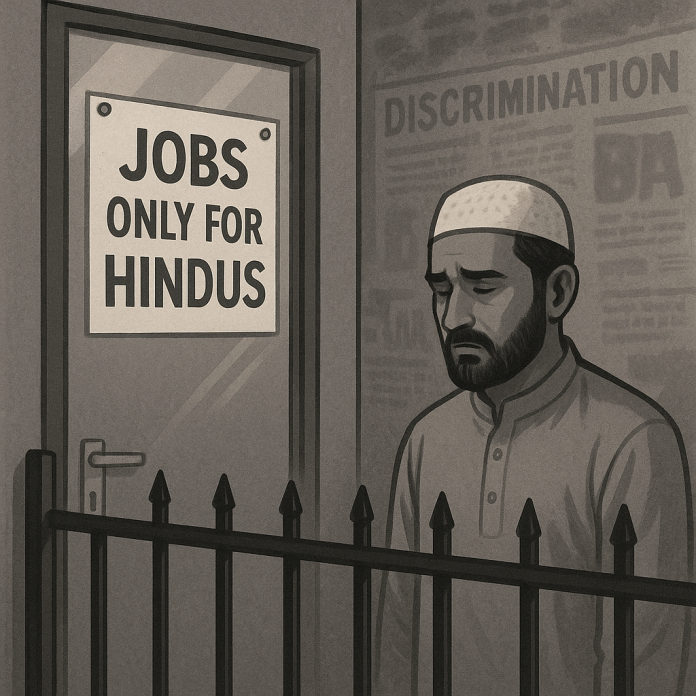New Delhi: A growing pattern of faith-based hiring discrimination is surfacing in India, as online job portals are reportedly allowing listings that explicitly exclude Muslim candidates. Civil rights groups and academics have raised alarms over this practice, calling it a form of economic apartheid targeting the Muslim community, reported the Quint.
Several job advertisements have surfaced with phrases such as “Only Hindu candidates” and “Hindu Samaj should be on top,” sparking outrage and concern over the normalization of religious bias in employment. These listings are appearing across various online platforms and recruitment agencies, under the guise of “cultural compatibility” or “company policy.”
Dr. Amina Khan, a sociologist at Jamia Millia Islamia, stated, “This is not an isolated phenomenon. It is part of a larger, institutionalized economic boycott of Muslims. These hiring filters are just one manifestation of an effort to economically marginalize an entire community.”
Investigative reports by independent journalists and civil society organizations indicate that recruiters often use code words or subtle language to bypass direct legal scrutiny. Muslim job seekers have reported repeated rejections, even when they meet or exceed all qualifications.
A software engineer from Bengaluru shared his experience: “I was told point blank that Muslims were not being considered for the role because the client preferred cultural compatibility.”
Such practices violate the spirit of Article 15 of the Indian Constitution, which prohibits discrimination on the basis of religion, caste, race, sex, or place of birth. Although private companies are not directly bound by Article 15, legal experts argue that digital platforms enabling discriminatory listings can be held accountable.
“Platforms facilitating such discrimination could face legal consequences. They are not above the law, and complicity in bias is also culpable,” said Advocate Fahad Ansari, a Mumbai-based human rights lawyer.
Despite the seriousness of the issue, government intervention remains lacking. The Ministry of Labour has yet to respond to the growing controversy, and job portals have done little beyond issuing vague disclaimers, citing the challenges of moderating third-party content.
Activists and legal observers warn that if left unchecked, this trend could widen the economic and social gap between communities in India. “This isn’t just about jobs—it’s about dignity, economic freedom, and equal opportunity. The silence of regulators is alarming,” said Mehmood Pracha, a legal activist from Delhi.
With India’s unemployment crisis already deepening—particularly among youth—the intertwining of religious identity with economic opportunity poses a serious threat to the nation’s constitutional fabric and secular ethos.




